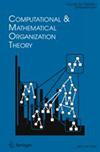面向对象的组织理论:创业对象在组织涌现中的作用
IF 1.5
4区 管理学
Q3 COMPUTER SCIENCE, INTERDISCIPLINARY APPLICATIONS
Computational and Mathematical Organization Theory
Pub Date : 2023-01-01
DOI:10.1177/26317877231153186
引用次数: 0
摘要
先锋派创业研究通过对创造组织新潜能的强大过程本体论,对组织理论做出了贡献;然而,这也进一步减少了学术界对组织作为对象的关注。由此可见,组织理论的核心实体——真正的组织——对于组织涌现的理论化意义不大。基于Graham Harman的面向对象本体(OOO),我们提出了这样的论点:对象与过程一样,可以具有企业家精神。在为面向对象的组织理论(OOOT)奠定基础的同时,我们认为,越来越多的关注将企业家精神视为一种品质,将组织理论引入到组织作为新兴自主寻求对象的奇怪现实中。这可以通过一种非文字的知识来实现,这种知识是由另一个对象的承诺来维持的,这个对象既不能简化为它的组成部分(包括过程本身),也不能简化为行动(包括组织的所有形式的关系决定)。最后,我们以Sun Ra和Arkestra为例讨论OOOT的独特性。本文章由计算机程序翻译,如有差异,请以英文原文为准。
Towards an Object-Oriented Organization Theory: The Role of Entrepreneurial Objects in Organizational Emergence
Avant-garde entrepreneurship studies have contributed to organization theory through a strong process ontology on the creation of new potentialities for organizing; however, this has also further diminished scholarly attention to organizations as objects. It follows that the core entities of organization theory—real organizations—matter very little for theorizing organizational emergence. Based on Graham Harman’s object-oriented ontology (OOO), we develop the argument that objects, not unlike processes, can be entrepreneurial. Laying the ground for an object-oriented organization theory (OOOT), we posit that increased attention to viewing entrepreneurship as a quality invites organization theory into the weird reality of organizations as emergent autonomy-seeking objects. This becomes possible by way of a non-literal knowledge sustained by the commitment of another object that is neither reduceable to its components (including process itself) nor actions (including all forms of the relational determination of organizations). We close by discussing the uniqueness of OOOT through the example of Sun Ra and the Arkestra.
求助全文
通过发布文献求助,成功后即可免费获取论文全文。
去求助
来源期刊

Computational and Mathematical Organization Theory
COMPUTER SCIENCE, INTERDISCIPLINARY APPLICATIONS-MATHEMATICS, INTERDISCIPLINARY APPLICATIONS
CiteScore
3.80
自引率
16.70%
发文量
14
审稿时长
>12 weeks
期刊介绍:
Computational and Mathematical Organization Theory provides an international forum for interdisciplinary research that combines computation, organizations and society. The goal is to advance the state of science in formal reasoning, analysis, and system building drawing on and encouraging advances in areas at the confluence of social networks, artificial intelligence, complexity, machine learning, sociology, business, political science, economics, and operations research. The papers in this journal will lead to the development of newtheories that explain and predict the behaviour of complex adaptive systems, new computational models and technologies that are responsible to society, business, policy, and law, new methods for integrating data, computational models, analysis and visualization techniques.
Various types of papers and underlying research are welcome. Papers presenting, validating, or applying models and/or computational techniques, new algorithms, dynamic metrics for networks and complex systems and papers comparing, contrasting and docking computational models are strongly encouraged. Both applied and theoretical work is strongly encouraged. The editors encourage theoretical research on fundamental principles of social behaviour such as coordination, cooperation, evolution, and destabilization. The editors encourage applied research representing actual organizational or policy problems that can be addressed using computational tools. Work related to fundamental concepts, corporate, military or intelligence issues are welcome.
 求助内容:
求助内容: 应助结果提醒方式:
应助结果提醒方式:


